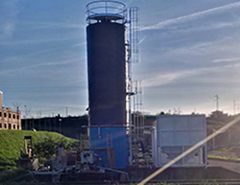HUNOSA generates energy for companies making use of liquid manure from stockbreeding and from waste food
29 July 2016 |

- The coal mining company is developing projects in the cities of Gijón and Luanco with stockbreeding estates and food companies which obtain significant energy savings using the new technology
HUNOSA generates energy and heat from stockbreeding manure and waste from the food industries. The company works on two facilities in Asturias: one in a stockbreeding estate in Eastern Asturias, and another in a food company in the middle of the region. The later one is already operating.
This is a new business line which comes from the development of the commercial activity regarding energy services, in this case linked to the business of biomass boilers at industrial facilities which is developed by the new energies department at HUNOSA. The bio-gasification of organic waste water makes possible obtaining an energy which supplements very well the energy services projects which the company is developing.
In this way it is possible to get the perfect combination between energy efficiency and environmental protection, something which lays at the root of all the projects which are being promoted by the management of the new energies department at HUNOSA. The technology used is called sequential anaerobic bio-gasification, which is highly competitive in comparison with other bio-gasification technologies.
Bio-gasification technologies
In what consists this method of sequential anaerobic bio-gasification? The sequential anaerobic bio-gasification takes advantage of the work carried out by bacteria in the decomposition of organic waste, capturing the methane gas produced in the process. The waste is treated at a plant on which “an orderly action is programmed” of the bacteria with a high efficiency level, both in terms of speed and of the decomposition of the organic material.
Thus, this technology makes possible to reduce the operating costs thanks to the decrease in the size of the required facilities for using the gas, reducing the time taken by the decomposition of the waste, and reducing the final waste which result in the process, which on the other hand, in this case, present a higher quality which allows their use as compost. All in all, the process results in energy and environmental savings.
Among the clearest uses of sequential anaerobic bio-gasification stand out the use of the liquid manure at the stockbreeding estates and of the waste generated by the food industry.
HUNOSA and Grupo SEPI
HUNOSA belongs to Grupo SEPI, a corporate holding which includes a total of 16 state-owned companies in which it has direct, majority shareholding participations, with a workforce of around 73,000 professionals in 2014; the Spanish state-owned television and radio corporation, Corporación Radiotelevisión Española, which is attached to SEPI, and one public foundation. Equally, SEPI has direct minority shareholdings in a further ten companies, and indirect shareholdings in more than one hundred companies.







